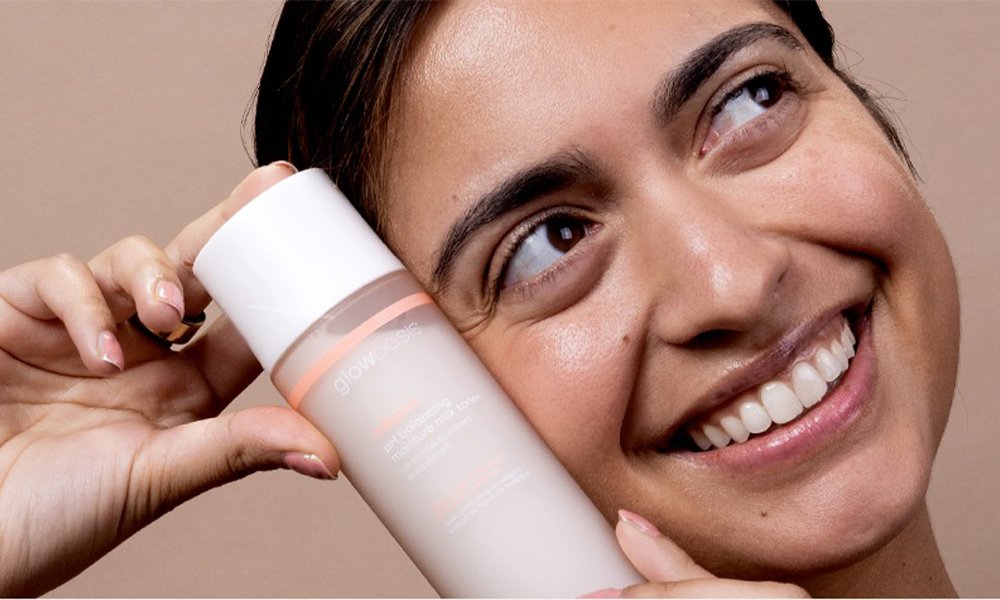Everyone wants glowing, luminous skin, but achieving that fresh, dewy look can sometimes be difficult to achieve. The good news is that glowing skin isn’t just for people with perfect genes. With the right skincare routine, a few simple tips, and healthy habits, you can achieve that luminous, healthy glow that everyone notices. In this blog, we share the top tips to achieve the perfect glow and maintain glowing skin every day.
1. Start with a clean face
The first step to glowing skin is always clean skin. Cleansing your face helps remove dirt, oil, makeup, and impurities that can clog pores and dull your complexion. A clean face is the perfect canvas for all your skincare products.
Choose the right cleanser: Choose a cleanser that suits your skin type. If you have oily skin, a gel or foam cleanser will work well. For dry skin, choose a creamy or moisturizing cleanser to help lock in moisture.
Don’t over-cleanse: While cleansing is important, too much cleansing can strip your skin of its natural oils, which can lead to dryness and irritation. Cleanse your face twice a day – once in the morning and once before bed.
A clean base will help your other skincare products work more effectively and give you a better chance of achieving a radiant, glowing complexion.

2. Exfoliate regularly
Exfoliating is the key to smooth, glowing skin. When dead skin cells build up on your face, they can make your complexion appear dull and uneven. Exfoliating removes those dead skin cells and reveals fresher, brighter skin underneath.
Choose the right exfoliator: There are two types of exfoliators – physical and chemical. Physical exfoliators contain small granules that scrub away dead skin, while chemical exfoliators use acids like AHAs or BHAs to dissolve dead skin cells. If you have sensitive skin, choose a mild exfoliator and avoid harsh exfoliators.
Gentle exfoliation: Excessive exfoliation can irritate your skin, so exfoliate 1–3 times a week. Be gentle and avoid scrubbing too hard, as this can damage your skin.
Exfoliation helps stimulate collagen production and improve skin texture, resulting in smoother, brighter skin.
3. Hydrate, hydrate, hydrate
Hydration is essential for glowing skin. When your skin is well hydrated, it looks plump, smooth, and radiant. Dehydrated skin, on the other hand, can look dull, dry, and flaky.
Drink plenty of water: The most important step for internal hydration is to drink plenty of water. Try to drink at least 8 glasses of water a day to keep your skin and body hydrated.
Use a hydrating moisturizer: A good moisturizer will lock in moisture and prevent your skin from losing moisture throughout the day. Look for a moisturizer that suits your skin type – gel-based formulas for oily skin and richer creams for dry skin.
Consider a hydrating serum: For an extra boost of moisture, you can add a hydrating serum with ingredients like hyaluronic acid. These serums draw moisture into your skin and help make it look plump and radiant.
A well-hydrated complexion naturally looks healthier and more radiant.

4. Don't skip sunscreen
Sunscreen is one of the most important steps to maintaining glowing skin. UV rays from the sun can damage your skin and lead to premature aging, dark spots and uneven skin tone. To protect your skin and maintain its natural glow, always apply sunscreen daily.
Choose the right sunscreen: Choose a sunscreen with at least SPF 30 to protect your skin from UVA and UVB rays. You can choose between chemical sunscreens or physical (mineral) sunscreens. Mineral sunscreens are often better for sensitive skin because they create a physical barrier against the sun.
Reapply regularly: Sunscreen wears off throughout the day, especially if you sweat or swim. Reapply sunscreen every two hours to maintain optimal protection.
By using sunscreen every day, you not only protect your skin from damage, but you also help keep it healthy and glowing.
5. Get enough sleep
Your skin regenerates while you sleep, which is why getting enough rest is crucial for glowing skin. Lack of sleep can lead to dark circles, dullness, and a tired complexion. When you’re well-rested, your skin looks more refreshed and rejuvenated.
Aim for 7-9 hours of sleep: Most adults need between 7 and 9 hours of sleep per night. A consistent sleep schedule is key to giving your body and skin time to repair.
Sleep on your back: If you’re prone to acne or puffiness, try sleeping on your back to reduce pressure on your face and prevent breakouts. You can also use silk pillowcases to reduce friction on your skin.
Good sleep supports overall skin health and helps you wake up with a brighter, more rested complexion.
6. Incorporate vitamin C into your routine
Vitamin C is a powerful ingredient when it comes to brightening and evening out your skin tone. This antioxidant helps brighten dull skin, reduce hyperpigmentation, and protect your skin from environmental damage.
Use a vitamin C serum: Applying a vitamin C serum in the morning helps protect your skin from free radicals and enhance its natural glow. Look for a serum with stabilized vitamin C as this will brighten skin more effectively.

Combine it with sunscreen: Vitamin C works best when combined with sunscreen. Together, they provide additional protection from UV rays and prevent skin damage.
Adding vitamin C to your skincare routine can help you get the radiant, glowing skin you’ve been dreaming of.
7. Maintain a healthy diet
What you eat plays an important role in the health and appearance of your skin. A healthy, balanced diet can help your skin look radiant and glow from within.
Eat a variety of fruits and vegetables: Fruits and vegetables are full of vitamins, minerals and antioxidants that nourish your skin. Foods rich in vitamin A (like carrots and sweet potatoes), vitamin C (like oranges and bell peppers) and omega-3 fatty acids (like salmon and walnuts) are especially good for healthy skin.
Avoid excessive sugar and processed foods: A diet high in sugar and processed foods can lead to inflammation and rashes. Reducing your consumption of these foods can help prevent dullness and blemishes.
Eating a balanced diet of nutrient-rich foods supports healthy skin and a glowing complexion.
8. Reduce stress
Stress can take a toll on your skin and lead to rashes, dullness and even premature aging. To maintain glowing skin, it’s important to find ways to manage stress.
Practice relaxation techniques: Meditation, deep breathing, yoga or simply taking time for yourself can help lower stress levels. Aim to engage in activities that calm your mind and allow you to unwind.
Take breaks: Whether it’s a quick walk outside or a few minutes of deep breathing, be sure to take breaks throughout the day to relax and recharge. Reducing stress not only improves your skin, but also boosts your overall well-being.
Bottom line
Achieving the perfect glow doesn’t have to be complicated. By following these simple tips – cleanse regularly, exfoliate, moisturize, wear sunscreen, get enough sleep, take vitamin C, eat well, and manage stress – you can enjoy radiant, healthy skin every day. Remember, radiant skin is a reflection of both good skin care and healthy habits, so treat your skin with care and it will thank you with that natural, luminous glow.




No Comment! Be the first one.